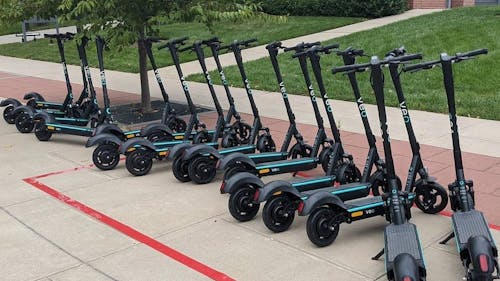Rutgers introduces electric scooters to campus

An alternative transportation option is available for students of Rutgers — New Brunswick: electric scooters (e-scooters).
“We wanted to bring in … something like this because we wanted more students to be using this instead of just using the buses,” said Jack Molenaar, senior director of Rutgers Transportation Services. “The buses are overcrowded.”
Right now, there are 300 e-scooters available for use on campus, in scooter stations and other locations that can be tracked using the e-scooter application, “Veo,” Molenaar said.
Molenaar said there would have been more scooters available if the majority of students were living on campus this semester. Alexander Carmenaty, a School of Arts and Sciences first-year, said the new transportation option is convenient for those in New Brunswick this semester.
“Although campus dorming is very limited and campus is not as populated as it usually is, I think it can be an advantage for students who are on campus to travel around,” Carmenaty said.
The e-scooters connect to the app using a QR code that can be scanned using the phone’s camera, and it costs $1 to begin the ride plus 28 cents per minute, Molenaar said.
To help both Veoride and students locate the scooters, Molenaar said there are GPS tracking units on each e-scooter. Veoride also monitors the battery life of each scooter and replaces them when necessary, so students do not have to worry about charging them.
Since the e-scooters arrived on campus, “Veo” has gained approximately 3,100 new users, Molenaar said, with 4,550 rides in the first three days.
Molenaar said Veoride hoped for three scooter rides per scooter per day, and so far, the average has been five.
Erin McGuire, a School of Arts and Sciences junior, said a new method of transportation is welcome given health concerns associated with coronavirus (COVID-19) disease.
“I think it’s a great resource for students to have access to, especially in the time of coronavirus, because Rutgers is still running the bus routes, but being in an enclosed space is not desirable right now,” McGuire said.
McGuire said the bike lanes on the College Avenue campus make it easy to use the scooters and said it may be helpful for students who are in a rush or running late to class.
Molenaar said one of the reasons why the University made an agreement with Veoride to bring e-scooters to campus is because sometimes buses are so full that students cannot get on them, which can make them late to class.
“You couldn’t get on the bus and you needed to get somewhere quickly. There’s a scooter right there,” he said. “You’re like, ‘OK, this is going to cost me a little money, but I’m going to get on that, and I’ll get to where I go faster.’”
The Veoride e-scooters can go 15 miles per hour, but tend to go a bit slower uphill, Molenaar said.
Giuliana Evangelista, a Rutgers Business School first-year, said she thinks Rutgers having the e-scooters is cool, and said they will be beneficial on such a large campus.
“I personally am terrified of falling, but I think others will definitely use this,” she said.
Students must be at least 18 years old to operate one of the e-scooters, Molenaar said. Veoride recommends users wear helmets, but they are not required.
“Just like anything, be safe when you’re using it,” Molenaar said. “Be cognizant of your surroundings.”
Carmenaty said he thinks the new e-scooter program will be more popular when in-person classes resume fully.
“Hopefully, we’ll be on campus next semester,” Carmenaty said. “If we are, I’d be willing to give them a shot, and I’m sure other (students) would too.”



